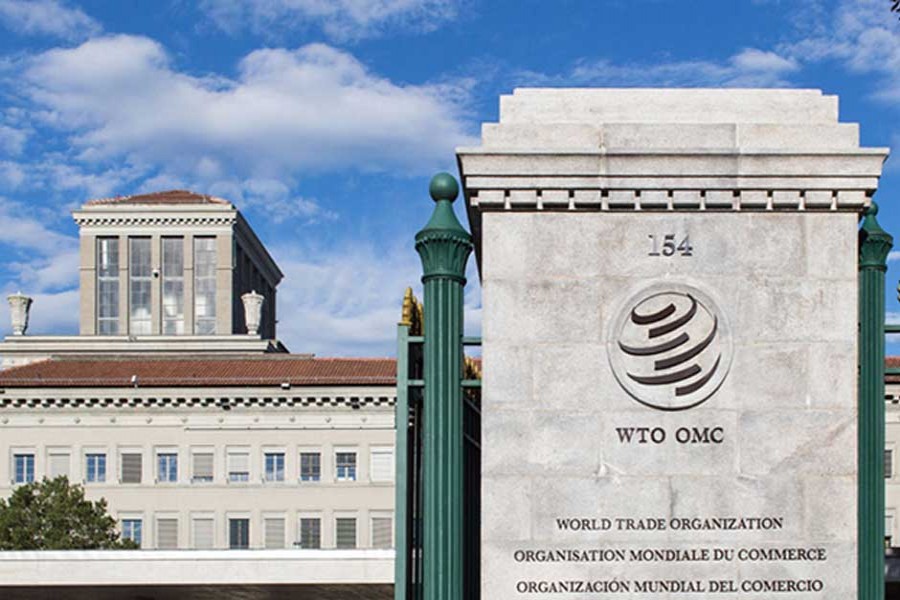
Published :
Updated :

The World Trade Organisation (WTO) is facing difficult times. To quote the news agency Reuters, the organisation is scrambling to develop a plan for the biggest reform in its 23-year history.
This is mainly due to US president Donald Trump's unilateral move of blocking appointments of judges and threatening to pull the United States out of the organisation has brought the dispute settlement mechanism of the global trade body to the brink of collapse by. President Trump has targeted the WTO as part of his wider campaign against trade arrangements that he contends have cost hundreds of thousands of US jobs.
It may be recalled that soon after assumption of office Mr. Trump left no doubts about his reservations for multilateralism and came down heavily with his utter dislike for what in his opinion was doling out trade preferences and facilities for the developing countries at the expense of the developed countries. Many at that time saw his oratory too sweeping and devoid of an understanding of the need for level playing field that the WTO is mandated to bring in the arena of international trade in goods and services. Over time, he has made his attacks more pointed in that his administration, unlike those of his predecessors, views the phenomenal growth of Chinese imports into the USA as an outcome of the WTO's 'indulgence' towards China.
Much of the US displeasure stems from its conviction that the WTO has tied its hands in dealing with China, which it accuses of dumping cheap goods on the United States to take market share and unfairly using government subsidies to lower Chinese companies' costs. US officials have repeatedly complained that the WTO's seven-member Appellate Body has gone beyond its remit. They allege that, WTO judges, acting as the supreme court of world trade, have given Beijing the benefit of the doubt on subsidies and rejected Washington's treatment of dumping.
When Mr. Trump first suggested withdrawing from the WTO during his presidential campaign, the organisation's top officials were more or less of the opinion that the United States could not afford to operate outside global rules, and ignored the complaint as just another gripe from one of the 164 member nations. Now they appear to have grasped the seriousness of the threat, and this clearly indicates that the WTO would have little sway over global commerce without the world's largest economy as a member.
Trump administration has ramped up pressure by blocking any move to fill vacancies on the Appellate Body as judges, taking the team down to three -- the minimum required to make rulings. The appeal system will cease to function altogether in December 2019 if the US ambassador to the WTO and deputy United States Trade Representative Dennis Shea blocks the appointment of two more judges who need to be replaced by that time.
The demise of the appeals system would paralyse dispute resolution and make negotiating new trade rules pointless. Appellate Body chief judge Ujal Singh Bhatia said in a speech, "The paralysis of the Appellate Body would cast a long and deep shadow on the continued operation of the multilateral trading system." The WTO has no executive power, but its members have a shared interest in following its rules.
Under US pressure, the WTO has begun discussing reform but found little agreement among members on the way forward. As part of its efforts to ride out the crisis, the WTO is working on proposals to increase the number of judges and rewrite trade rules for industrial subsidies, state-owned firms and technology transfer.
Since its founding in 1995, the WTO has stopped governments from arbitrarily raising trade barriers and disrupting the flow of goods.
Members can air grievances before clashes materialise, and the WTO's dispute settlement system allows them to seek binding rulings from judges.
The WTO rules on dumping, according to some observers, are ambiguous -- the result of a political compromise at the WTO's creation in 1995. US ambassador to the WTO Shea has said the judges have often "strayed" and taken liberties with their own rules of procedure, ignoring deadlines and staying on cases after their official departure dates. He says such breaches may invalidate their work, adding "We've been making these points for not just 15 months but for 15 years. Our proposal is that the Appellate Body needs to abide by the rules we agreed to in 1994."
Clearly, blocking the appointment of judges is one way of challenging China, that too in the wake of a raging trade war between the USA and China. In September, the European Union and Canada, which had separately drawn up reform proposals for the WTO, presented their ideas to a packed audience of diplomats from developing countries. The United States has also teamed up with the European Union and Japan to push for tighter rules on government subsidies of exports, state-owned firms and the forced transfer of technology from foreign partners, issues often raised in US criticism of China's trade practices. Another issue that the USA considers unfair is the way two-thirds of WTO members, including China, declare themselves "developing" and thereby qualify for about 140 provisions in the WTO rules that grant benefits and more lenient treatment to developing nations.
Seeing things going from bad to worse over the past years, it is in the interest of global trade that the WTO should be allowed more space to assume its role in a credible manner, and this can only be achieved by convergence of ideas in favour of rule-based multilateral system that the organisation has been working on, despite odds.


 For all latest news, follow The Financial Express Google News channel.
For all latest news, follow The Financial Express Google News channel.